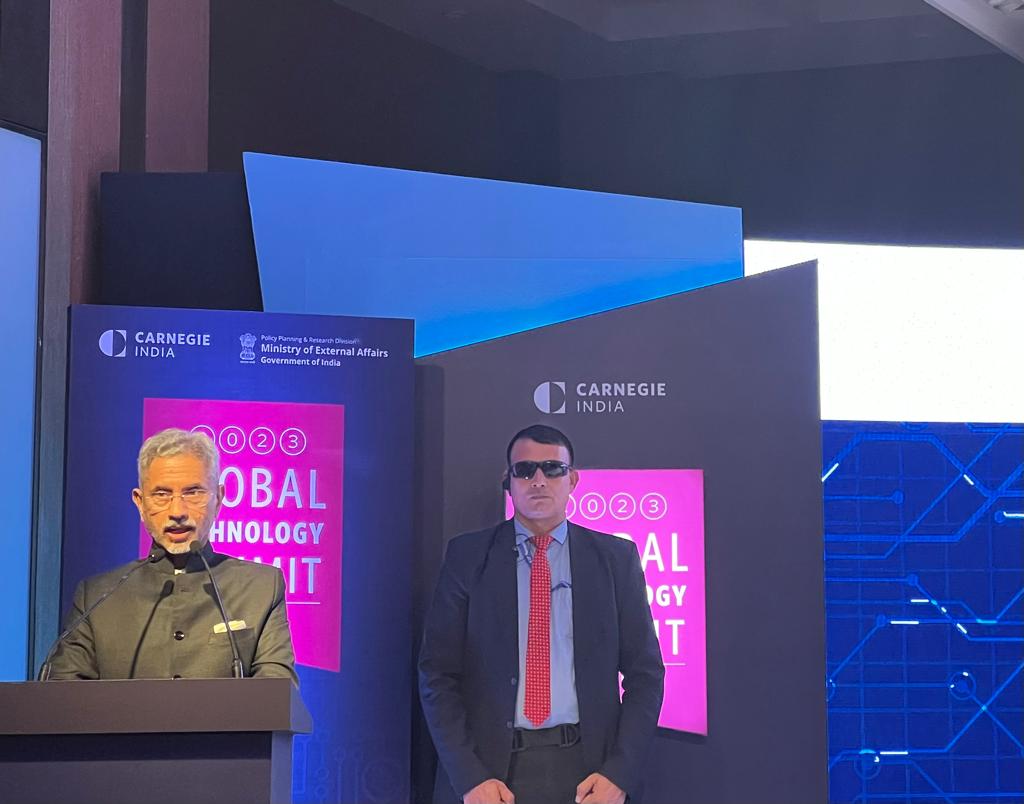
Underlining India’s foreign policy of strategic autonomy at a conference in New Delhi, India’s External Affairs Minister S. Jaishankar highlighted how India has expertly juggled its relations with rival powers, including the US and Russia as New Delhi’s choice of partners has expanded in the last few years.
In his remarks at the Global Technology Summit, hosted by Carnegie India in partnership with India’s Ministry of External Affairs in New Delhi on December 4, Mr Jaishankar vehemently countered the impression that India is becoming overdependent on the US, saying overdependence is used by critics as “a selective political and ideological label.”
Overdependence?
Placing India’s relationships with key power centres in a historical perspective, the minister argued that the West is India’s natural technological partner. “I have always been clearly advocative of the fact that when it comes to tech in the broadest possible sense, really our natural partner are western economies. That’s why Quad has been helpful, the Trade and Technology Council with European Union has been helpful,” he said.
“These are our technology partners, they are our markets, they are our investors, these are places where mobility from which this country can benefit and skill development can happen. There is a big agenda there, particularly with respect to US and Europe,” the minister said.
Asked about the argument of some that this is leading to “overdependence” on the US, Jaishankar countered, saying that “overdependence is a rationalisation of inaction.” “You don’t want to do something, you say don’t do it because you will get overdependent. It is a curious argument. You use it against some countries, not against others.”
“Look at India’s trade figures and tell me where are we overdependent. I can tell you where we are overdependent. The accounts where we have enormous trade deficits and where often we are dependent on for very basic things. But that’s not where you hear the overdependence argument. Politics sometimes masquerades as national security. There are ideological agendas.”
Alluding to India’s rising global stature, Mr Jaishankar said that “in the past three decades, and definitely in the past decade — a period that coincides with India’s wider engagement, especially with the West, India’s options had expanded and it was natural for a country to make the best use of it.
Amid Donald Trump’s rising poll numbers, Mr Jaishankar pointed out that India’s relations with the US have continued to expand regardless of who is in the White House. “If a relationship can actually prosper with five different presidents, the data clearly indicates a certain stability. There is enough investment from both sides. There is a structural soundness to the relationship.” He underscored that from the Indian perspective, the India-US relationship is “proofed” against political change.
Russia ties saved India
The minister defended India’s decision to continue ties with Russia in the shadow of the Ukraine war, crediting Moscow with “saving India” at times in the past. “We have a relationship with Russia and it is not a relationship which happened in an instant. It is a relationship of close to 60 years,” he said. “I see a problem defined in a way as though somewhere there’s some handicap that India has by having this relationship. But this relationship has saved us many times. Partly there is a lot of history and the force which has been a defining aspect of the India, Russia relationship. If you look at the Eurasian landmass, it makes sense that India and Russia would have strong relations because it is in accordance with the first principle of politics of your neighbour’s neighbour.”
Author Profile

- Manish Chand is Founder and Editor-in-Chief of India Writes Network (www.indiawrites.org) and India and World, a pioneering magazine focused on international affairs. He is CEO, Centre for Global India Insights, an India-based think tank focused on global affairs.
Latest entries
 India and the WorldFebruary 17, 2026South-by-South: Focus on people-centric solutions at India AI summit
India and the WorldFebruary 17, 2026South-by-South: Focus on people-centric solutions at India AI summit India and the WorldFebruary 7, 2026Modi hails interim India-US trade deal, Goyal says no concessions made on agriculture
India and the WorldFebruary 7, 2026Modi hails interim India-US trade deal, Goyal says no concessions made on agriculture India and the WorldFebruary 2, 2026Trump announces trade deal with India, Modi ‘delighted’
India and the WorldFebruary 2, 2026Trump announces trade deal with India, Modi ‘delighted’ India and the WorldJanuary 31, 2026Palestinian minister bats for mediatory role for India in ending Gaza conflict
India and the WorldJanuary 31, 2026Palestinian minister bats for mediatory role for India in ending Gaza conflict







